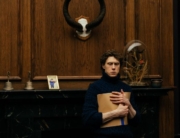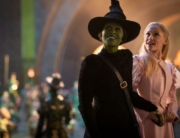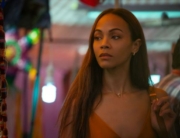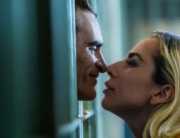It’s 1976, and Vivienne (Minnie Driver) has dropped acting and returned to her small Welsh hometown to make a living teaching high school drama. Vivienne, or Viv, is the classic cool teacher in any high school movie. She doesn’t care about your grades, or how much pot you smoke, as long as you’re becoming a more interesting person in her classroom.
That’s why her students, otherwise not the school’s finest, are willing to work hard for her musical version of The Tempest. She asks the students to pick their favorite songs as the play’s soundtrack, and suddenly Shakespeare is set to a score of then-contemporary glam rock and performed with shadow puppets and giant papier-mâché mushrooms.
This is well-trod territory capitalizing on the time when High School Musical seemed unstoppable, but what works here is the music. It may be a meandering episode of Glee guest-starring Minnie Driver, but it’s a good one. If you can close your eyes and ignore the improbably fantastic high-school orchestra version of Nick Drake—or David Bowie’s “Life on Mars?”—then this can be a really enjoyable film. ELO, Roxy Music, and the Beach Boys fill out a soundtrack that’s almost worth the price of admission.
But as a story, Hunky Dory is spread too thin. Viv’s students are the film’s emotional focus, and there are so many story lines to follow and so little happens in each. In one subplot, two of the play’s male band members are in a secret relationship. The girl’s brother finds out, he is upset, then he gets over it, and the storyline ends.
Some story arcs are more developed than others. Davey, the play’s lead vocal, is the most prominent of all of Viv’s earnest yearlings. Played by Aneurin Barnard from the London stage version of Spring Awakening, Davey’s quest for the heart of his theatrical partner Stella (Danielle Branch) is believable, but his story doesn’t have enough depth to remain interesting past his performance.
All these different plot threads don’t add up to much beyond the idea that growing up is difficult. There are issues with sexual orientation, skinheads, the role of arts education, love and disappointment, a class system brought to task, and, in general, a revolution of youthful energy that parents just don’t understand. The film feels most centered when focused on Viv, whose journey of pride and individuality mirrors Hunky Dory’s teenage protagonists. Their climactic class performance is exuberant but lacks the reward of a narrative coming to a close. Rehearsal struggles aside, Viv and her kids seem to have accomplished little more than pass the time together.
Is Hunky Dory a wet noodle of a Wet Hot American Summer or a biting High School Musical with a different tempo? Should we focus on Viv or her kids? Fittingly, and in some ways true to the high school experience, none of these underdeveloped story lines achieves a real resolution by the time credits roll. The kids just go through things, mostly hard things, and graduate.







Leave A Comment